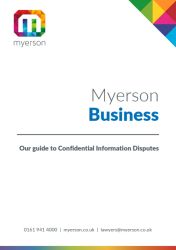What Is Misuse of Confidential Information?
Misuse of confidential information is a basic legal principle that a person who has received information in confidence cannot take unfair advantage of it and cannot use the confidential information without obtaining the consent of the person who passed on the information.
To be protected by the law of confidential information, the information must be confidential in nature and disclosed in circumstances importing an obligation of confidence.
Disputes can often arise in respect of whether the nature of the information was actually confidential. Whilst it may be obvious in some cases, such as in the case of a secret formula, in other instances, the information may be similar to that already in the public domain.
Misuse of Confidential Information FAQs
What is Confidential Information?
Confidential information is defined as information that meets the following criteria:
- Confidential in Nature: The information must not be public knowledge or widely available.
- Disclosed in Confidence: The circumstances of disclosure must clearly imply an obligation of confidence
When does an obligation of confidentiality arise?
If an obligation of confidentiality arises, our solicitors are here to help you. An obligation to keep information confidential can be imposed by:
- A contract;
- Implied because of the circumstances of the disclosure; or
- Implied because of the special relationship between the parties concerned e.g. employee/employer or solicitor/client.
The best way to protect confidential information is to enter into a stand-alone confidentiality agreement before the confidential information is disclosed.
Our Intellectual Property team can advise on the drafting and implementation of such confidentiality agreements.
How long does confidential information remain confidential?
Confidential information can be protected for as long as it remains confidential which, in theory, could be forever. However, there are a number of restrictions to this:
- Information which becomes out of date, and which ceases to have any commercial value;
- Confidentiality agreements which are time-limited;
- Time-limited restrictive covenants in an employee’s employment contract; and
- Technical information provided to public authorities for securing regulatory approval are typically time limited.
Where a document is read by the Court, or referred to at a public hearing, confidentiality in the information covered in that document will immediately be lost.
Examples of confidential materials which may be protected:
- Formulas not capable of analysis in the final product;
- Recipes which are not apparent from the final product;
- Processes;
- Business methods (until they are used in public);
- Financial and statistical information;
- Customer lists;
- Plans, sketches and drawings;
- Improvements to products or processes;
- New inventions whilst a patent application is pending;
- Business plans;
- Computer programs; and
- Discoveries, scientific theories or mathematical methods.
What remedies do I have if my confidential information has been misused?
The remedies available for an action in misuse of confidential information are account of profits, inquiry as to damages, injunctions and/or delivery up and destruction.
The usual measure of damages is that the defendant should compensate the claimant for the loss which the defendant has caused to the claimant.
In some circumstances, however, the damages payable can be calculated by reference to the fee the parties would have agreed would be payable by the defendant for the use of the confidential information in a hypothetical bargain.
The Courts have shown a willingness to issue and continue injunctions in certain instances, particularly where a disclosing party uncovers the recipient’s intention to use the confidential information before the breach of confidentiality takes place. However, injunctions are of little or no use once the information has been disclosed or used.
Our Approach to Misuse of Confidential Information
Misuse of confidential information claims can be extremely technical and complicated andare therefore managed by specialist Courts in England and Wales.
At Myerson, we will provide you with high-quality legal advice and support if you are either bringing or defending a misuse of confidential information claim.
Given the sensitive nature of confidential information cases, we will always explore all potential legal solutions.
The suitable remedies will depend on the individual circumstances of your matter; however, you will be advised as to the most effective solutions available to you.
Our Experience with Misuse of Confidential Information
Advising on confidential information pursuant to criminal proceedings shared publicly.
We acted for a client whose identity was protected in respect of criminal proceedings during his childhood.
We successfully defended the case for our client by preparing cease-and-desist letters to an American website and various private individuals, demanding that they cease sharing our client’s personal information.
As a result, we obtained a successful result, and the confidential information was removed.
Advising on Exit and Intellectual Property Rights
We advised a client on his exit from the in-house software development division of Balfour Beatty. Our client had, as part of his employment, worked on a software mapping tool which was used by Balfour Beatty internally for projects but which was not marketed externally to third parties.
Our client wanted to try and agree terms with Balfour Beatty to take a licence or enter into a joint venture in order to market the software externally.
We helped negotiate the client’s termination of employment, advised our client on his rights in relation to the intellectual property, identified the nature of his intellectual property and proposed potential structures for our client to have an ongoing relationship with Balfour Beatty.
Later, we advised our client in relation to court proceedings brought by Balfour Beatty for an injunction, damages and the destruction of the software.
Balfour Beatty alleged that our client was in breach of contract, in breach of confidence and had infringed copyright. Balfour Beatty withdrew its claim against our client at an early stage and we recovered our client’s costs.
Why Choose Our Intellectual Property Solicitors?
- Our intellectual property experts advise clients on a broad range of intellectual property matters, from initial registration and exploitation to protection and enforcement.
- Our specialist IP litigation team is also highly experienced in handling business disputes involving intellectual property.
- Myerson is a member of the Intellectual Property Lawyers Association (IPLA), an association of law firms with an established intellectual property office. Our membership provides our clients and us with access to a wealth of knowledge and expertise in intellectual property.
- Through our many years of service, we have close working relationships with trade mark and patent attorneys and regularly liaise with them on a wide range of intellectual property issues, such as registering trademarks, patents and design rights, and when disputes arise concerning intellectual property rights. These working relationships are a key element of the service we offer to our clients.
- Myerson is also the Manchester and Cheshire law firm member for the MSI Global Alliance, a top 20 ranked international association of independent professional firms. As the IP matters we deal with often involve an international element, we can call upon the expertise and knowledge of our fellow MSI members to ensure that our client's global interests are protected.
Testimonials
Meet Our Intellectual Property Solicitors
Home-grown or recruited from national, regional or City firms. Our intellectual property lawyers are experts in their fields and respected by their peers.
Contact Our Experts
You can contact our lawyers below if you have any more questions or want more information:









